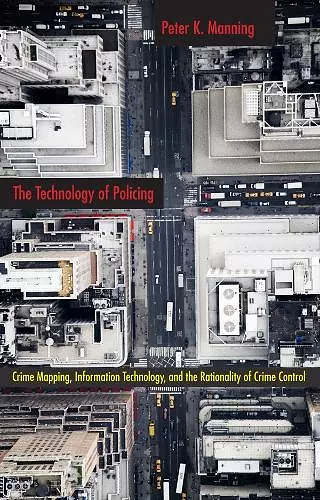The Technology of Policing
Crime Mapping, Information Technology, and the Rationality of Crime Control
Format:Paperback
Publisher:New York University Press
Published:1st Jan '11
Currently unavailable, and unfortunately no date known when it will be back
This paperback is available in another edition too:
- Hardback£74.00(9780814757246)

This work examines the influence of technology on modern policing, revealing insights into crime management practices and the effectiveness of various strategies in The Technology of Policing.
In The Technology of Policing, noted scholar Peter K. Manning explores the profound impact of modern technology on law enforcement practices. Over six years, he conducted extensive observations of three American police departments and two British constabularies, aiming to understand how advanced tools, particularly crime mapping, have reshaped policing strategies. As surveillance technology has advanced, police now have access to sophisticated methods for tracking and predicting crime patterns, leading many to argue that these innovations contributed to the significant crime reduction seen in the 1990s.
Manning's research reveals a complex relationship between technology and police work. While the tools available to law enforcement have become more sophisticated and data-driven, the fundamental strategies and tactics employed by police have not undergone the transformation one might expect. The book delves into the rhetoric surrounding crime control and highlights the varying degrees of effectiveness of different approaches. Manning emphasizes the importance of critically assessing which technologies genuinely enhance crime management and which may inadvertently hinder it.
Ultimately, The Technology of Policing provides readers with a nuanced understanding of how information technology is reshaping police departments. It invites a thoughtful discussion about the implications of these changes for the future of policing and the ongoing challenges faced by law enforcement in a rapidly evolving technological landscape.
The Technology of Policing provides a brilliant analysis of how new information technologies are used to reproduce established police practices rather than to effect organizational change or more efficient crime control. -- Richard V. Ericson,co-author of The New Politics of Surveillance and Visibility
At a time when police technology is actively promoted as a & silver-bullet, and studied mainly for its instrumental effects, Mannings sociological acumen is a vital antidote. A closely and astutely observed study of the meanings and effects of crime mapping/analysis within police organizations. -- Ian Loader,author of Civilizing Security
Mannings work is both sophisticated in its approach and tremendously rich in the detail of its empirical inquiry. Few scholars take the time and have the access and ability to research police practices so meticulously and with the advantages that come with many years of energetic experience. * American Journal of Sociology *
A richly textured analysis of the introduction, use, and effects of crime mapping technology in three police departmentsBoston, Washington, DC, and a medium-sized American city referred to as & Western. * Journal of Information Technology and Politics *
ISBN: 9780814761366
Dimensions: unknown
Weight: 431g
338 pages